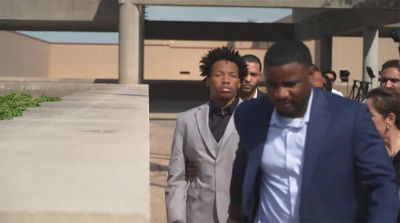
A coalition of North Texas religious leaders and parents has joined a legal effort led by an activist minister to stop the state’s new law requiring the Ten Commandments to be displayed in public school classrooms.
The suit, initiated by Dominique Alexander — known for advocating on behalf of a suspect in a high-profile murder case of Austin Metcalf — targets Senate Bill 10, signed into law by Gov. Greg Abbott last week and set to take effect Sept. 1.
Filed in the U.S. District Court for the Northern District of Texas against Texas Education Agency Commissioner Mike Morath and the Dallas, DeSoto, and Lancaster Independent School District boards, the lawsuit claims SB 10 is unconstitutional because it “unconstitutionally pressures students into religious observance, reverence, and adoption of the state’s mandated religious scripture.”
The law requires a 16-by-20-inch poster or framed copy of a state-approved version of the Ten Commandments to be displayed in every public school classroom.
Alexander, who has children attending public school in Dallas, “believes that the religious displays required by SB 10 send a message of religious intolerance, which also conflicts with his family’s personal civil rights and spiritual beliefs, implying that anyone who does not believe in the state’s official religious scripture is an outsider and not fully part of the community.”
The lawsuit contends that the displays also violate parental rights because SB 10 “substantially interferes with … parents to direct their children’s religious education and upbringing.”
SB 10’s mandated displays, which include text like “I AM the LORD thy God” and “Thou shalt have no other gods before me,” unconstitutionally pressure students into adopting the state’s preferred religious doctrine, the suit states. “This is wholly inconsistent with the fundamental religious-freedom principles [sic] upon which our nation was founded.”
The filing also cites the 1980 Supreme Court case Stone v. Graham, which struck down a similar Kentucky law, adding, “For almost half a century, it has been well settled that the First Amendment forbids public schools from posting the Ten Commandments in this manner.”
The filing identifies Alexander as “a Christian minister and social justice advocate” whose family members are “all members of a local Christian church and attend regularly.” But Alexander finds the Ten Commandments displays “deeply offensive because the overtly religious classroom displays mandated by the law will promote and forcibly subject his children to religious scripture in a manner that he believes violates his and his children’s civil rights.”
One of those concerns, the lawsuit states, is that “some of the text within SB 10’s version of the Ten Commandments, treats some people as chattel.” The lawsuit did not provide any additional context, but the concern appears to stem from the bill’s quotation of Exodus 20:17, which states, “Thou shalt not covet thy neighbor’s wife, nor his manservant, nor his maidservant, nor his cattle, nor anything that is thy neighbor’s.”
Alexander, according to the suit, is “concerned that by posting this text, the state sends the message to his children that slavery is acceptable, which directly violates core spiritual beliefs and civil rights that Minister Alexander teaches his children to value.”
It adds that “as a spiritual matter, it is critical that this text be presented to his children by him or through the family’s church, to avoid his children receiving this harmful message.”
The plaintiffs also include Christian ministers, Islamic leaders and parents with children in the Dallas, DeSoto and Lancaster school districts. They argue the law’s specific Protestant-leaning version of the Ten Commandments conflicts with their beliefs and excludes other faiths, such as Hinduism, Buddhism or Judaism.
One of the suit’s plaintiffs, Bishop Gerald Weatherall, expressed concerns in the complaint, stating that he “believes in the autonomy of the Church and the divine authority of the Holy Spirit to guide the hearts and minds of believers, not the coercive hand of the state.”
“The government should govern; the Church should minister,” Weatherall was quoted in the complaint. “Anything else is a threat to the soul of both our democracy and our faith.”
Alexander, president of Dallas-based advocacy group Next Generation Action Network (NGAN), has been visibly active in the defense of 18-year-old Anthony, who was indicted Tuesday for the murder of Frisco High School football player Austin Metcalf in April.
Alexander has his own criminal history, including a conviction for child abuse charges, vehicle theft, check forgery and evading arrest, reports Fox 4.
In response to a request for comment, NGAN shared a statement by Alexander regarding Anthony’s indictment: “Justice takes time, but truth always rises. We’re not here to argue online — we’re here to fight for fairness, accountability, and the rights that every American should be afforded.”
SB 10 has received support from religious liberty advocates like Matt Krause, a former state lawmaker and current legal and policy advisor to First Liberty Institute, which called groups like the NGAN, American Civil Liberties Union (ACLU) and Freedom From Religion Foundation and others who oppose SB10 “radical” and “incredibly well-funded.”
“The Ten Commandments are a symbol of law and moral conduct with both religious and secular significance which provide valuable lessons for students,” Krause said in a statement Friday. “First Liberty was grateful to support these important bills and appreciates [the] leadership of Governor Abbott and all the elected officials who made this happen.”

















